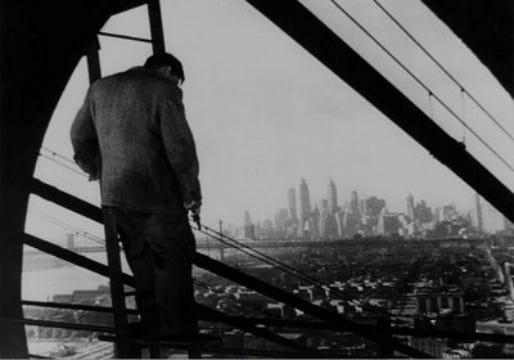The Naked City (1948)

Other than the cinematography and editing, both of which won Academy Awards, "The Naked City" isn't a particularly well-made movie. The acting is hammy, even amateurish at times, and the pacing is so uneven there are occasions you could wander out of the room, prepare and eat a nice snack, and come back without having missed anything critical.
But as an early example of what would come to be known as film noir, this 1948 crime drama did things that were way ahead of its time. Its gritty take on the squalor and urban decay of post-war New York City was remarkably pessimistic for that era.
And the hard-bitten cynicism of the narrator — actually producer Mark Hellinger, who died after recording his lines — bleeds through the audio like a pickax against metal. My favorite line is near the end when, the mystery of a beautiful model's murder having been solved, he comments upon the media spotlight thrown on the case by the newspapers: "Her name, her face, her history were worth five cents a day for six days."
The plot, while frequently pedantic, essentially created the model of the police procedural that would become a staple of movies and television for decades to come. It shows a case being worked step-by-step from the inside out, rather than the usual "flash of genius" stuff to which audiences were accustomed.
I really liked director Jules Dassin's decisions to cast genuine-looking people in most of the key roles and to use real New York locations as his backdrop — most notably in the culminating chase as the murderer climbs to (and falls from) the top of the Williamsburg Bridge.
Aside from Don Taylor as clean-cut young detective Jimmy Halloran and socialite/witness Ruth Morrison (Dorothy Hart), none of the other actors have classic Hollywood looks. Even Howard Duff as key suspect Frank Niles, a conniving playboy on the make, has the droopy look of a heel about him.
The other supporting parts are a litany of bulbous noses, balding pates, paunchy midsections and seamed faces. The film goes out of its way to be as egalitarian as possible in reflecting the entire untidy spectrum of the Big Apple, as summed up in the closing line: "There are eight million stories in the Naked City. This has been one of them."
At the beating heart and soul of the picture is Barry Fitzgerald as Lieutenant Dan Muldoon, a crusty old Irish-American homicide detective who knows all the tricks in the book. Barely over five feet and wizened, Fitzgerald nevertheless seems to command every room he's in, pulling quietly on his pipe and staring down whoever he's talking to like the Lord of All Hobbits.
(Fitzgerald holds a special place in film history as the only actor ever to be nominated for an Academy Award twice for the same performance. He won the Supporting Actor award for "Going My Way" but lost out in the Lead Actor category. Subsequently, the Oscar rules were changed to prevent this from reoccurring.)
The story begins with the murder of Jean Dexter, whom we eventually learn to be a small-town girl who went to the big city and ended up chasing the bright lights straight toward her murder. Interestingly, I couldn't find any credit for who played her even though we see a blonde woman being chloroformed at the beginning and her body again at the morgue.
After much circuitous investigating — delayed mostly by Niles, who seemingly cannot speak without telling a lie — the trail finally leads to the doorstep of Willie Garza (Ted de Corsia), a former wrestler who loves to play the harmonica. Curiously, we never actually see or hear him blowing on one.
The final sequence is the film's highpoint, as Garza flees from the cops through the streets of Manhattan. What was really crazy about this sequence is that the narrator, who often addressed the characters the camera was following as if they could hear him, actually starts giving the villain advice on how to get away! He tells him to be calm, not to overreact or run, etc.
Of course, if he actually heard that voice in his head, he didn't follow the sage counsel offered. Otherwise, "The Naked City" might have had a very different ending. This is one of those flicks that managed to stake out a notable place in film history without actually being particularly good.
3.5 Yaps



